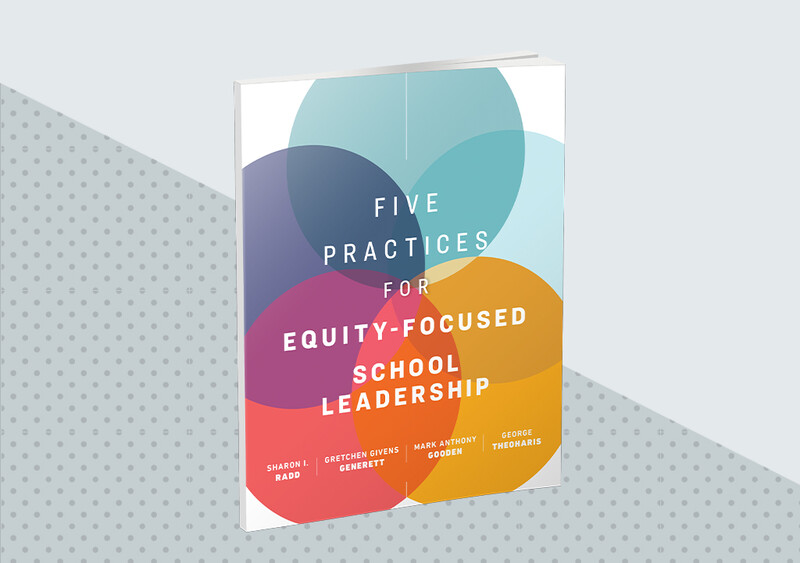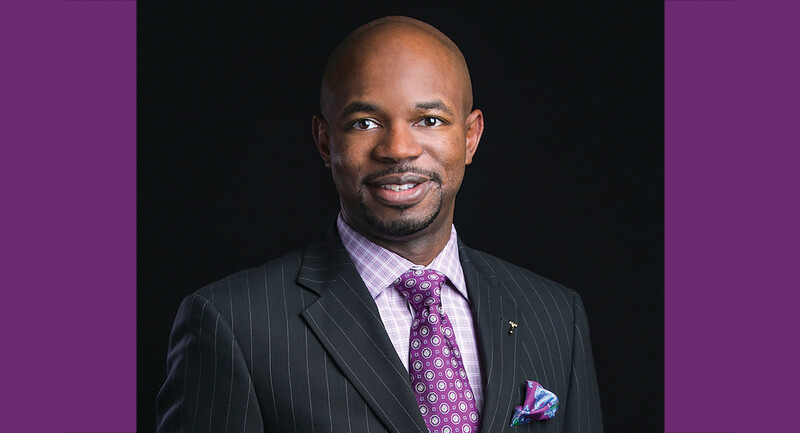Effective principals are essential to school improvement, and comprehensive principal-development programs can help schools and districts cultivate and support school leaders who bring a host of key competencies to the job. But according to Mark Anthony Gooden, a professor at Teachers College, Columbia University, and an ASCD author, principals and other school leaders often lack a solid grounding in one of the most critical and sensitive areas in education today: educational equity.
In a new report published by the Wallace Foundation, Gooden and his coauthors Muhammad Khalifa, Noelle Arnold, Keffrelyn Brown, Coby Meyers, and Richard Welsh argue that, to tackle deeply entrenched problems in schools and meet the needs of underserved students, today's principals must be better versed in "culturally responsive school leadership" (CRSL). They define CRSL as a form of equity-centered leadership focused on interrogating and disrupting cultural barriers to achievement and belonging in schools. Not only must principals become more fluent in this practice, the authors maintain, but CRSL should be infused throughout principal-development systems, from leadership standards to preservice training to evaluation and support. As they write, school districts must better "prepare and support principals to do the hard work of addressing historic and persistent inequities so that all students will learn and flourish." We recently talked to Gooden about CRSL and the skills and orientation school leaders need today.
Can you go into a little more depth on culturally responsive school leadership? Most educators at least know about culturally responsive teaching, but this is a less familiar concept, right?
Yes, but it is closely related to culturally responsive teaching, or culturally sustaining pedagogy. For us, it's the idea that leaders have a critical awareness of the inequities in schools, which are often historic and systemic. And these leaders want to move in a direction where they influence school climate and structure, as well as teacher efficacy and student outcomes, with an emphasis on cultural inclusion and competency. A primary aspect of this is working to increase belongingness in schools, especially—though not exclusively—for minoritized students. We want to make sure leaders understand that students are situated differently in schools and in society—that there are barriers and inherited conventions that create opportunity gaps throughout our systems. Having awareness of that systemic inequity—and being willing to address it—is very important for school leaders today.
The term "critical consciousness" comes up numerous times in your report. What does this mean for you and why is it such an important trait for school leaders to have?
This is a deep awareness, developed over time, of inequities in all their layers and at all their levels. So, leaders who have developed critical consciousness have an understanding of systems of historic oppression that have often become entrenched in school systems. This understanding enables these leaders to think about how they are going to create more equitable environments.
Leaders who have developed critical consciousness have an understanding of systems of historic oppression that have often become entrenched in school systems.
It's important to emphasize that this means taking steps to change current conditions and resources, not just recognizing inequity. In working with schools and districts, we often find that people recognize inequities in particular environments—they even expect them to be there—but fail to question them. For example, they may understand that a particular school with a high percentage of students of color doesn't get as many resources and so has a problem retaining teachers. And they'll say, "That's unfortunate but it happens, right?" But as a leader, you are called to ameliorate that situation, to do more than just state the fact. You can't let such acceptance of historical inequities go uncontested. You have to question why this is OK for some schools or districts but not others. So critical consciousness means having that lens to see the context of the current reality and say, "This has to change. We have to do things differently."
What other traits or behaviors do culturally responsive leaders tend to exhibit?
That's a good question because there are some things that may not be obvious or apparent on the surface. But I find that folks who do this work and do it well are extremely positive people. They're very hopeful for the future. They look for possibilities where others don't. They also recognize the need to be vulnerable. They are learners, right? So, we're not talking about this traditional heroic type of leader that we often hold up as models in leadership-prep programs. Culturally responsive leaders are leaders who know how to offer people grace because they know that they're not perfect and they're going to make some mistakes. They're also inspirational folks who are passionate about supporting underserved students.
But they are also realists, and they hold people accountable and expect them to truly teach children who have been minoritized. Because of this, for some people, they can come off as abrasive. It sounds strange, but in today's environment, people are often surprised when someone in power speaks up for students who are living in poverty, for example. They're surprised when someone is trying to think differently about how school is structured and how we might change conditions that inherently disadvantage some students. So, these are leaders who can stand up to a certain amount of pushback and skepticism and defense of the status quo.
You and your coauthors argue in the report that culturally responsive school leadership needs to be infused throughout school leadership-development systems, including principal pipelines. What do you see as barriers to that? Why has it been a missing element in the past—and even now?
If we go back historically and are honest about how we started to train leaders in education, you'll find we were looking at business schools as models. The people in charge of educational leadership training were thinking they could just apply some business principles to school leadership and then they would be in good shape. It's only recently, as we started to dig deeper into social sciences research, that we began to realize that to socialize students in a democracy, we need to develop different kinds of leadership capacities.
We have to be very intentional and explicit about making cultural responsiveness and competence an expectation for school leaders in a diverse society.
In addition, you have to remember that our education system—going back to Thomas Jefferson right through segregation and beyond—has always prioritized the white experience, particularly the white male experience. We always have to ask who leadership-development programs have been normed on, both in terms of the leaders and the types of students who would be centered in their systems. The bottom line is that the lack of emphasis on culturally responsive school leadership is built into our history. The fact that we only recognize the experiences of certain people is built into our structures. So now we have to move the conversation along and be very intentional and explicit about making cultural responsiveness and competence an expectation for school leaders in a diverse society.
What advice do you have for current and aspiring school leaders on becoming more culturally responsive in their practice?
Whether you're a school or district leader, you definitely want to have some type of equity vision that outlines your objectives and priorities. You want to develop that and have it as a North Star, so that your staff can start to explore and speak that language and you can work with them on awareness. The ASCD book I coauthored, Five Practices for Equity-Focused School Leadership, outlines how to do this. Another important part of the process is diving deep into your own identity. There are concrete exercises leaders can use to gain critical consciousness of their own identities and where they fit within our systems of inequity and racial hierarchy. These identities tend to be reinforced by narratives in our culture and in our own lives, and we have to break them down to understand our own biases and presumptions about what's acceptable in school systems and who belongs.
In my work as a consultant in schools, I've found that people tend to be resistant to talking about race in this way, though it's gotten a bit better in recent years. But as I remind leaders, breaking down that resistance paradoxically starts with you doing your own work. If you haven't reflected on race and your biases around ability and sexual identity, for example, you need to do some of that before you stand up in front of people and begin talking about these issues. You don't have to be perfect in this. You just have to be courageous enough to say, "I'm going to jump into this even though I'm stepping away from comfort."
What's your advice for district or school system leaders on better prioritizing and supporting culturally responsive school leadership at the systems or program level?
I'm glad you asked the question because one of things we found in our report is that there hasn't been much focus on culturally responsive leadership at the district-infrastructure level. We have to ask ourselves how leadership happens in school districts, how it's thought about and supported. Superintendents have to drive this conversation. And again, for us, a big part of this is having an equity vision—something that guides principals' development and that they can refer to in evolving their practice and in honing their own equity vision.
I have also worked with school boards to develop equity policies that can undergird the district vision, and I think that can be very powerful. But school board members and district leaders also have to do the necessary self-work. It's fine to have a policy or statement on racial equity, but you should have some rich exercises around what that statement means. Oftentimes there's some very powerful language in there, but if you haven't done the work to dive a little deeper into it or reflected on what it means in practice, are you really owning it and seeing it through?
I know from doing presentations that leaders often like the sound of what I'm talking about, in terms of equity or culturally responsive practice, but are resistant to actually getting too closely involved. But think about the message that sends. If it's always the Black and Brown people speaking about this, then you are inherently saying: That's their thing, not our thing. It's a fringe issue, not a front-and-center issue. We have to get beyond this mindset that allows us to opt out. That in and of itself is a big part of how we improve the conversation. As a district leader, you don't have to have all the details in place, but you have to make a commitment to that equity vision and say, "I'm going to make space for principals to learn on this, I'm going to make space for teachers to get professional development." These are the kinds of structural issues that you have to address. How are you going to create this learning community around doing good equity-focused work?
Are there indicators leaders can look for to see if culturally responsive leadership is taking hold in a school system? What would you look for in observing or analyzing a district's work?
At the building level, I would look for evidence of who's represented—in the pictures and the student work on the walls, in the types of historical heroes they are promoting. You should see diversity in the teaching staff. That can be difficult in some districts just because of demographics, but if I walk into an elementary school and see they have three Black men teaching, I would definitely make note of that because it tells me there's something different going on at the leadership level. Maybe that principal has a mindset that makes those individuals feel validated in their experiences. Another thing I would note is how the staff is talking about discipline and using data to respond to students' needs. In classrooms, are the students engaging and learning together, or are you seeing something more like old-school tracking? Who's in special education and who's truly benefiting from those services, as opposed to just being held there?
Culturally responsive school leaders have to disrupt these patterns. They have to get beyond the coded language we often used in conversations on racial issues.
These are just some of the familiar patterns we have seen over the years, and as I mentioned, school communities often see these things and recognize they are not OK, but they don't always think they have the tools to challenge them. They might not even so much as raise a question about them. But culturally responsive school leaders have to disrupt these patterns. They have to bring these conversations to the surface and get beyond the coded language we often used in conversations on racial issues.
Given the pushback against equity initiatives in some districts, what makes you hopeful that culturally responsive leadership can move forward and be adopted on a larger scale?
I'm hopeful when I work with young people. I worked in a district recently where a lot of the adults were against the kind of work I'm talking about, but they had some young people who'd been in the system and gone on to really good colleges, and they came back saying, "Yes, I was prepared academically, but I wasn't ready to be a global citizen. I was nervous about interacting with people who were different from me." This district was supposed to give them a 21st century education, but these graduates felt it wasn't really grappling with these issues of diversity and representation. So, they challenged the adults to get past their fears and their insistence on holding on to the way they had been educated. Student leaders, who argued for becoming antiracist, also attended meetings with adults and were part of the discussion. Generally, I find young people want to broaden their learning experiences and challenge biases and barriers that are embedded in our systems. You can see this in their general acceptance of gender transitions. They are pushing us to acknowledge that there's a different world that's coming.
Leaders have to measure up to this. If you have a graduate profile that speaks of educating global citizens, you can't just use that language casually. You have to provide environments and experiences to help students engage with people who are different from them and with topics that are different from the generally accepted narrative. And to do that effectively—and be able to navigate all the challenges that come up—you have to do that work on critical consciousness. You can tell—I can tell in my work with districts—when leaders have not done this work, and it's not conducive to the kinds of conversations we need to be having today.
Editor's note: This interview has been edited for space.
Five Practices for Equity-Focused School Leadership
A comprehensive guide for school leaders engaging their school communities in transformative systemic change.










